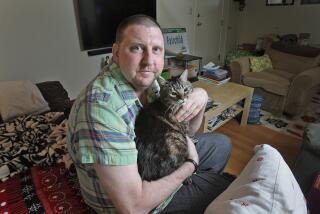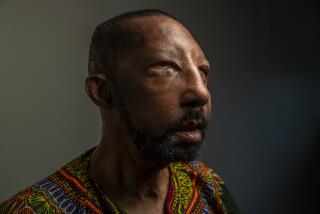Daily Ordeal : Costa Mesa Man, Victim of Virus, Takes Heart as He Waits for One From Donor
- Share via
SAN DIEGO — Until last summer, Raymond Smallcomb’s life style was like that of many young Southern Californians who live near the ocean.
When not taking classes at a community college, Smallcomb, 22, of Costa Mesa surfed and played two-man volleyball under the sunshine at Newport Beach, as yet not touched by the tragedy that had felled so many members of his family.
For, although his mother and a sister died of an unknown virus that attacks the heart, Smallcomb appeared to be living a normal life, unaffected by the malady.
“He was the guy who would take the largest wave and could get out of it no matter what,” said his father, Thomas Smallcomb.
With his son now facing a challenge more formidable than any wave he ever conquered, Smallcomb hopes that his son once again will find a way to “get out of it.”
As the same virus that claimed the life of his mother, sister and seven other blood relatives threatens now to take his own life, the younger Smallcomb waits for a new heart at a San Diego hospital, attached to a device that acts as an artificial heart outside of his body, providing oxygen to his blood and pumping it through his body.
Each day as he waits, doctors say the situation can worsen as the odds for complications and infection increase.
The signal that something was wrong came last summer, when his shortness of breath and general weakness provided the first signs that the same virus that has so devastatingly plagued his family had struck him, withering the left side of his once-healthy heart.
Last month, Smallcomb was taken to Sharp Memorial Hospital so his kidneys, pancreas and partly collapsed lung could be strengthened with the help of a machine called the acute ventricular assist device.
Sharp Hospital has done transplants on 46 patients since 1983, said Judy Coburn, Sharp’s transplant coordinator.
Smallcomb is first on the list of 10 people waiting for heart transplants there, but a recent shortage of donors has made the need even more critical, Sharp officials said Friday.
Most patients on the list for donated hearts are not expected to live more than a few months. Because Smallcomb is the only patient on mechanical life support, he is scheduled to be the next recipient of a heart from a donor with type O blood.
In the meantime, the college student, whose 6-foot-4-inch frame now only holds 120 pounds--60 pounds less than he once weighed--passes his time visiting with his family from Costa Mesa and talking with nurses. When his family can’t be with him, he watches videos of his nine brothers and sisters and their children.
A visit Friday with his father, stepmother and younger sister on his 42nd day on the machine was much like previous ones.
His stepmother, Amy, said that although the past 6 weeks have tempered Raymond’s outlook on life, the wait for a donor has tested the entire family’s faith and confidence.
“I’ll never forget a few weeks ago I said to him, ‘What’s going on in your head?’ as he looked straight ahead, and he said, ‘I don’t know if I’m going to make it,’ ” she recalled.
Tears came frequently to his eyes during the early visits, she said, but since then doctors have told the family that Raymond may now be pulling out of a deep depression.
“I haven’t seen tears in the last 2 weeks,” she said.
Although the machine has pumped oxygen-rich blood back into his failing organs, bringing them back up to strength, he remains isolated in intensive care, connected to the machine by an 8-foot line that acts, in his stepmother’s words, “like an umbilical cord.”
Recently, the family’s ordeal nearly ended when the heart from a 17-year-old with type O blood became available after the youth was killed in a drive-by shooting in Southeast San Diego.
Thomas Smallcomb rushed down to the hospital after midnight March 18 to meet with doctors. But at 4 a.m., doctors told him that the potential replacement heart could not be stabilized, explaining that it had stopped beating as they attempted to transport it to the hospital for possible transplantation.
But that incident--and two others in which families of other potential donors asked doctors not to go through with the organ donation wishes of their dying relatives--has not undermined the family’s hope that a heart eventually will become available.
“I think it’s made us more aware,” said Thomas Smallcomb, whose entire family now has organ donor cards attached to their driver licenses. “We would hope that our family would be a recipient of a heart just like any other family, and we know that others after us will need them. We will be available to help others who come forward after us in any way we can.”
“Every day, you wake up thinking it is going to be the day,” Amy added, referring to the uncertainty of the wait for a heart or the possibility of her stepson’s death.
“It could go either way.”
More to Read
Sign up for Essential California
The most important California stories and recommendations in your inbox every morning.
You may occasionally receive promotional content from the Los Angeles Times.













